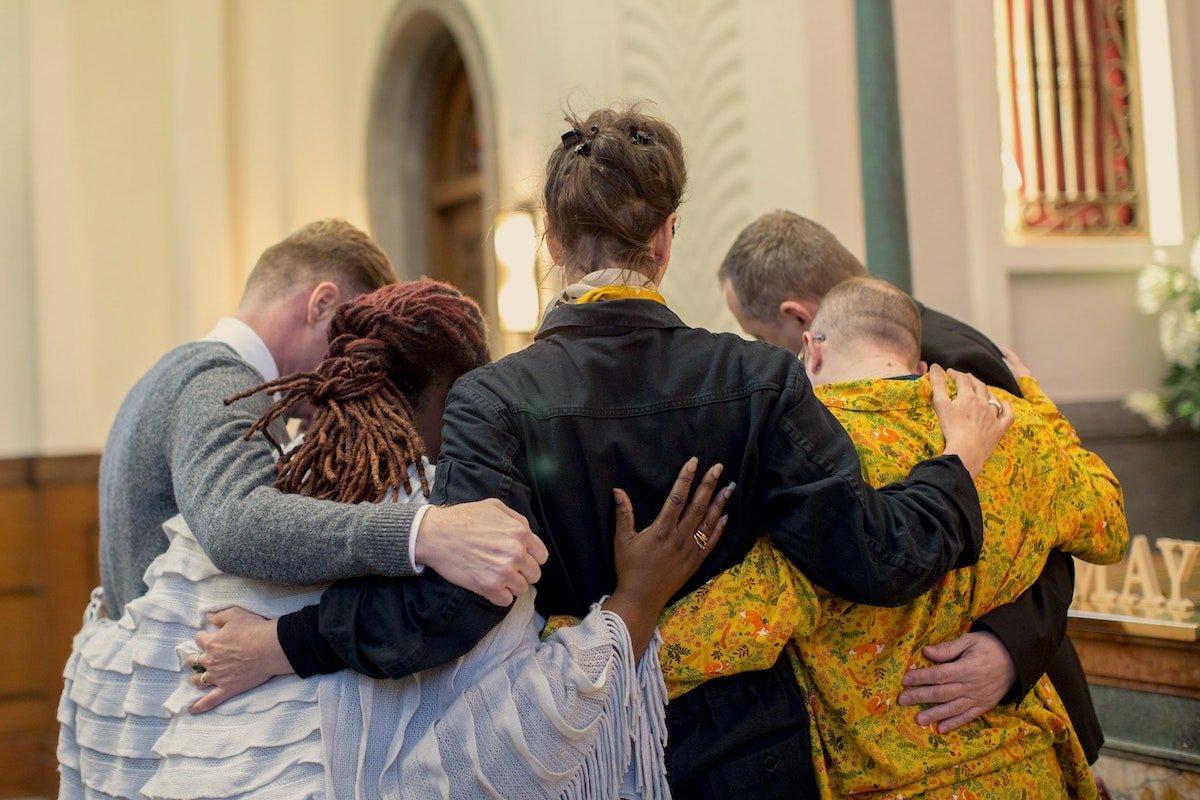4 Additional Griefs when Someone You Love Dies—And How to Find Hope Again
This article is part 2 of the series When Grief Comes to Church. We hope it can provide comfort and resources to the individuals who feel grief most acutely and the church who cares for them.
Article 1: Grief and the Individual
Article 2: 4 Additional Griefs and How to Find Hope Again
Article 3: 3 Ways the Church Ministers in Grief
Though some discuss “moving on” from grief, this may feel insensitive to the bereaved; as if they’re being asked to leave their loved one—and a part of their heart—behind. Yes, grief is an experience that one “goes through” but it’s also an experience that goes with you.
Like an amputee, healing after a significant loss does not mean going back to one’s pre-loss state. It means learning how to walk again—in a new way. Or perhaps, becoming something different altogether.
However, on this journey of becoming, the soul is greatly afflicted and pushed to find a way to process the pain. Personally, this great affliction entered my soul after my firstborn son, Ty, died in a flash flood, Nov. 2020. Since then, grappling with God through prayers of lament has proven vital in allowing grief to expand my soul rather than shrivel it.
Like an amputee, healing after a significant loss does not mean going back to a previous state.
It means learning how to walk again—in a new way. Or perhaps, becoming something different altogether.
This article contains pieces of those laments from early on in my grief journey: anguish, guilt, doubt, fear, and learning to walk again. I try to capture the experience of each affliction to help normalize the “crazy” you may be feeling. Then I try to help you with the harder part of lament—the part where you choose to trust.
These encouragements are not meant to shortcut the emotions of grief, but to help you ponder the voice of truth when the voice of pain feels relentless.
1. Grieve the separation
When tears weren’t pouring out, they seemed to leak from my eyes. I would fall asleep with tears and wake up to tears.
I could no longer hold my boy and comfort him. I could not give him a “redo” or ask him about his choices that day. In a moment, we were separated—an impassable ocean of distance between us. This ocean tempted to swallow me whole. I was battered with wave upon wave of anguish, longing, and “restless love."
Restless Love so anxious to be put in action. Love SO missing the object of its affection. It’s like this, …. I’m her Mama, I grew her inside me. And while she was growing, so too was an extra space in my heart reserved for pouring love and energy into her. Then, it all just…stopped. And it’s not a love you substitute or reallocate to another. It’s her love, HER portion of my heart. And now it’s restless. Obviously, I will go on loving her forevermore, but I can no longer love on her….and that’s making me crawl out of my skin. (Ashley Stock, Little Miss Momma)
I carried these varied pains in my emotions and also in my body. My heart physically ached. Extra pounds of weight hung on my bones like the weight of grief hung on my soul. Some people repeatedly get sick. Others may actually be diagnosed with “broken heart syndrome” with heart attack-like symptoms because of the emotional pain manifested in the body.
Bottom line: the pain of separation can be excruciating and felt in every cell of one’s being. Excruciating. How interesting that this word—used only to describe the worst kinds of pains—originated from the practice of crucifixion. Literally “from the cross.“
“Jesus came to make a way for us to be one with God and one with one another. Restless love will one day rest. ”
Dear sufferer, in our excruciating pain, let us cling to this truth: there is one who suffers with us and suffered for us. Jesus wept when his friend Lazarus died. He was a man of suffering, familiar with pain (Isa 53:3). Then, in the fullness of love, he bore our pain in order to defeat our pain. The cross was the heel that crushed Satan’s head; the empty tomb—the picture of what happens to death.
Christ’s death and resurrection secured the end of the story—a day when the ocean of separation will evaporate. A day when all our anguish will be overcome by sight. We will gaze into the eyes of our Savior, and “He will wipe every tear.” In His restored world, “there will be no more death or sorrow or crying or pain (Rev 21:4).” No more bitterness of restless love—only the joy of loving on one another forevermore.
So until that day, entrust yourself to the “Father of compassion (2 Cor. 1:3).” He keeps track of all your sorrows. He collects all your tears in a bottle (Ps. 56:8). And one day, He will wipe all your tears away.
2. Deal with guilt.
“If only I had been a better parent/spouse/friend..."
“If only I wasn’t five minutes late…”
“If only I had listened...”
The “what if’s” of grief are endless.
Although outsiders don't usually pass blame, the weight of these questions may wrack the bereaved’s mind as they go to bed or in the quiet of every car ride. Even a well-intended, “It’s not your fault,” does very little for the guilt-laden conscience of the bereaved.
How?
If this is your experience, Colin Smith's chapter on Guilt and Grievance in For All Who Grieve may be helpful:
If you have something on your conscience, don't ignore it in the hope that it will go away. And don't let people persuade you that it doesn't matter. Your conscience is a gift from God, and its voice must be heard.
The first step is to try and discern between true and false guilt. False guilt comes when you take responsibility for something that God did not call you to do or for something that was not under your control. True guilt comes when you shirk responsibility for something that God has called you to do or when you do what God has commanded you not to do.
The answer to false guilt is truth. And the answer to true guilt is grace. Our Lord Jesus Christ is full of grace and truth. And this means that, in him, we have all that we need for dealing with guilt—whether it be true or false.
Pray and discern: Is your guilt true or false?
If it's false guilt, what truth do you need to cling to?
If it is true guilt, what do you need to confess and possibly learn from?
“We lay our lists of guilt—true, false, and “unsure”—at the foot of the cross and let Christ do what we cannot: lift the burden of guilt”
Either way, the solution is the same. We lay our lists of guilt—true, false, and “unsure”—at the foot of the cross and let Christ do what we cannot: lift the burden of guilt and cleanse our conscience from the stain of sin (Lev 16:20-22; Heb 9:14, 10:22, Psalm 139:16).
Dear sufferer, let us remember: If the blood of Christ is good enough for God, it is good enough for us. Perhaps in an act of faith, mark these words over your lists: forgiven, cleansed, released.
Also, run to this refuge—God is sovereign over our length of days. Psalm 139:16 says, “In your book were written, every one of them, the days that were formed for me.” Though we may never fully understand the interweavings of human responsibility and divine sovereignty, we can find solace knowing that, ultimately, it is God who gives and takes away (Job 1:21). We can’t mess up God’s timeline.
3. Face your doubt and fear.
On occasion, someone would say to me: “I’m glad you have your faith.” In other words: “I’m glad you have something to help you cope.” I think that person would be equally glad for me if I found strength in Buddha, the universe, or Santa Claus.
However, from my very raw perspective, if I’m believing a man-made myth, but in actuality, my son is just gone—forever— this does not bring solace, but only despair.
So I would wonder: Is my faith rooted in truth? Is there really a heaven? Is Ty really ok?
Like a knife, these doubts would pierce my comfort and assault my peace.
“Do not be afraid to wrestle with hard questions.
The truth has the power to strengthen, comfort, and breathe hope into grief.”
In these moments, two practices helped me.
Review the evidence for the historical reliability of the Bible.
Evaluate the life of Jesus against any other.
Here are just two claims from Jesus:
In John 14:6, Jesus states, “I am the way, the truth, and the life.”
In John 11:25-26, he states, “I am the resurrection and the life. Whoever believes in me will live, even though he dies. And everyone who lives and believes in me will never die.”
Let those claims sink in for a moment. Who says stuff like that!?! Is this a crazy man? A liar? An evil man? Or could it be that He actually claimed to be?
Let’s consider his life. He fulfilled hundreds of ancient prophecies, was accused of no wrong, performed countless miracles, and spoke with uncanny insight into God's kingdom and peoples' hearts. He was crucified for claiming to be God and rose from the dead—just like he said he would.
When I confront my doubts with the uniqueness of Christ, they melt away. I know that Ty is safe. And with awe and gratitude, I can’t help but utter the words of Peter:
“Lord, to whom would we go? You have the words of eternal life (John 6:68).”
Dear sufferer, do not be afraid to wrestle with hard questions. The truth has the power to strengthen, comfort, and breathe hope into grief. In fact, how does one find genuine comfort without truth? In the words of C.S. Lewis:
If you look for truth, you may find comfort in the end; if you look for comfort you will not get either comfort or truth only soft soap and wishful thinking to begin, and in the end, despair.
4. Lament the disorientation.
When a member of a family dies, it takes a long time to find balance. It’s hard to accept the empty chair, the empty bed, and the new way the family functions. When Ty died, I didn’t just grieve my individual relationship with him, but also the significant role he played in our family. He was mini-me to my husband, best friend to his siblings, the extroverted playdate planner, and the warmest hugger.
When that piece of the family puzzle is removed, the hole is gaping.
How does a younger sibling now act as the oldest sibling? Who does a brother go outside and play with? How do I relate to the communities I was connected to because of Ty?
I suddenly felt separated not only from Ty but also from everyone living around me.
How do I engage in regular life when all my mind can think about is the missing piece of the puzzle? The hole of Ty’s absence felt as palpable as Ty’s presence once had. Living life with this hole seemed insurmountable.
Dear Sufferer, if you find yourself crippled by your loved one’s absence, not knowing how in the world you and your family can possibly walk forward again, please listen to Christ’s words to you…
“Come to me, all who labor and are heavy laden, and I will give you rest. Take my yoke upon you, and learn from me, for I am gentle and lowly in heart, and you will find rest for your souls.” (Matt 11:28-29)
On the road forward, take heart: you do know the most important place to go…to Jesus. Come to him. Again and again. In tenderness and with great care, He will teach you how to walk again.
“I will instruct you and teach you in the way you should go; I will counsel you with my loving eye on you.” (Psalm 32:8 NIV)
“Come to Jesus. Again and again. In tenderness and with great care, He will teach you how to walk again.”
Remember, Jesus sent the Holy Spirit (The Helper) to be with us; to give us courage, strength, spiritual enlightenment and perhaps most importantly- to pour God’s love into our hearts (Rom 5:5).
And if it’s from a broken heart we find ourselves crippled, won’t it be from God’s love being poured into every layer of pain and every empty, aching spot, that we will find the ability to walk again?
So my prayer for you is this: “that you, being rooted and established in love, may have power, together with all the Lord’s holy people, to grasp how wide and long and high and deep is the love of Christ, and to know this love that surpasses knowledge—that you may be filled to the measure of all the fullness of God (Eph. 3:17-19)
And Lord, by this great love, would you heal and restore? Guide and strengthen. Allow this affliction to expand our hearts and not harden them. Would you strengthen us in our weakness and enable us to walk forward in love?
Now to him who is able to do immeasurably more than all we ask or imagine, according to his power that is at work within us… (Eph 3:20).”
Amen.
Liz Williams resides in North Carolina with her husband, Travis, and three children: Zoe, Zac, and Cali. Her oldest, Ty, went to be with Jesus in November 2020. Liz delights in exploring God’s creation, waking up to coffee and the Bible, laughing with friends, discipling women, exercising and writing. Liz holds degrees in Christian Education and Nursing.
We’ll send one succinct weekly email
with the best news, events, and info
for churches in the Houston area.
Photo by The Good Funeral Guide on Unsplash











What are the warning signs of burnout and what can ministers do to recover from or prevent it altogether?